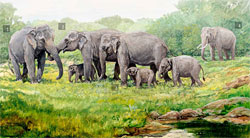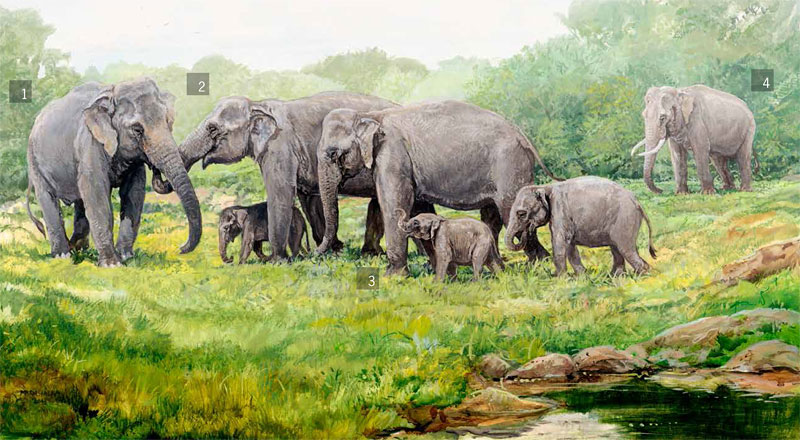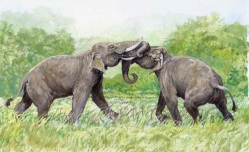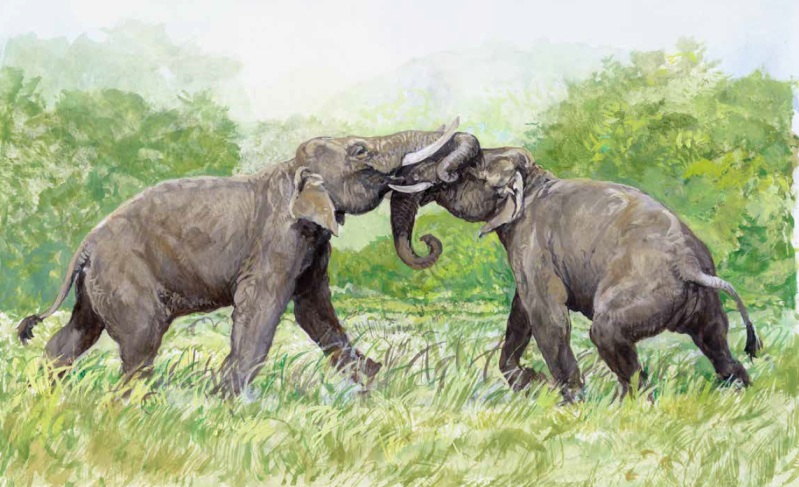Elephant Valley
Menu- WELCOME TO THE ELEPHANT VALLEY!
- FROM ASIA OR AFRICA?
- FROM THE LIFE OF ELEPHANTS
- WATER OVER GOLD
- BIG EATERS
- ELEPHANTS ENDANGERED
- HARD LIFE WITH ELEPHANTS
- HARD LIFE WITH PEOPLE
- PARTNERSHIP OF PEOPLE AND ELEPHANTS
- ELEPHANTS IN CEREMONIES
- ELEPHANTS AT WORK
- ELEPHANTS FROM PINNAWALA
- GANESHA
- ELEPHANTS IN HINDUISM
- THE SOVEREIGN WHITE ELEPHANT
- THE DREAM OF THE WHITE ELEPHANT
FROM THE LIFE OF ELEPHANTS
Elephants are highly intelligent animals with a long lifespan, a renowned memory and make family bonds which frequently last their whole life. Their social arrangement is one of the most complex amongst mammals.
UNDER THE LEADERSHIP OF A MATRIARCH
A herd of female elephants is led by an older experienced female – a matriarch. Her knowledge, acquired with age, is of inestimable value for everybody, and the other females in the herd thus willingly follow her judgement.
THE IMPORTANCE OF TOUCH
Although elephants communicate mainly with sounds and smells, touch is also of great importance in their lives. For example, touching the mouth of another elephant with one’s trunk serves as a greeting, like an analogy to a human kiss, and the simplest way to calm an agitated calf is to caress it with the trunk.
SOLID BONDS
The elephants’ basic social unit is a mother with several young of different ages. These close families occasionally wander alone, but remain in contact, at least from a distance, with members of the wider family, with whom they have strong emotional bonds. If conditions allow, they will join them in larger herds.
THE RESTLESS MUSTH PERIOD
A bull elephant comes into musth for several months a year. He becomes irritable and aggressive because of the influx of sex hormones, intolerant of any rival, and searches for suitable mates. However, he can sire offspring at any time of the year. The typical signs of a bull in musth are swollen temporal glands, which discharge a special secretion, and the continuous dripping of urine.
Although male elephants most often mate in the musth period, they can sire offspring at any time.
The typical signs of a bull in musth are swollen temporal glands which discharge a special secretion, and the continuous dripping of urine.
TWO SEPARATE WORLDS
When a calf elephant is born, its whole life is determined based on the sex it belongs to. A cow elephant spends its life in a tight-knit group of relatives; a bull elephant, on the other hand, has to leave its native herd between the ages of 13 and 15, as soon as it starts to reach maturity, and the rest of its life is relatively solitary at times.
LIFE ON ONE’S OWN
Bull elephants can stay in loose groups, although more often they willl live alone. Nevertheless they know their neighbours and they know their place in the hierarchy, which they figure out by wrestling with their tusks and trunks. Serious fights are therefore rare – in a dispute the subordinate male will usually back down.



